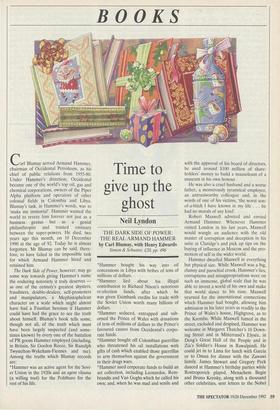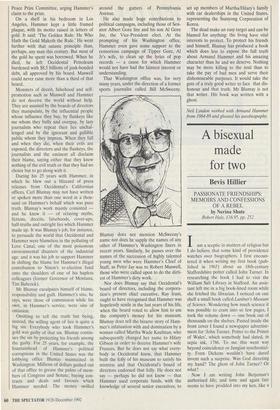BOOKS
Time to give up the ghost
Neil Lyndon
THE DARK SIDE OF POWER: THE REAL ARMAND HAMMER by Carl Blumay, with Henry Edwards Simon & Schuster, .f20, pp. 496 Carl Blumay served Armand Hammer, chairman of Occidental Petroleum, as his chief of public relations from 1955-80. Under Hammer's direction, Occidental became one of the world's top oil, gas and chemical corporations, owners of the Piper Alpha platform and operators of other colossal fields in Colombia and Libya. Blumay's task, in Hammer's words, was to 'make me immortal'. Hammer wanted the world to revere him forever not just as a business genius but as a genial philanthropist and trusted emissary between the super-powers. He died, two years ago this month, on 10 December 1990 at the age of 92. Today he is almost forgotten. Mr Blumay can be said, there- fore, to have failed in the impossible task for which Armand Hammer hired and retained him.
The Dark Side of Power, however, may go some way towards giving Hammer's name the enduring notoriety it truly deserves — as one of the century's greatest shysters, fraudsters, double-dealers, self-promoters and manipulators, a Mephistophelean character on a scale which might almost have had a Faustian heroism if Hammer could have had the grace to see the truth about himself. Blumay's book tells some, though not all, of the truth which must have been largely suspected (and some- times known) by every one of the battalion of PR goons Hammer employed (including, in Britain, Sir Gordon Reece, Sir Ranulph Twystelton-Wykeham-Fiennes and me). Among the truths which Blumay records are: *Hammer was an active agent for the Sovi- et Union in the 1920s and an agent vliyana (a willing tool) for the Politburo for the rest of his life.
*Hammer bought his way into oil concessions in Libya with bribes of tens of millions of dollars.
*Hammer lied about his illegal contribution to Richard Nixon's notorious re-election funds, after which he was given Eximbank credits for trade with the Soviet Union worth many billions of dollars.
*Hammer seduced, entrapped and sub- orned the Prince of Wales with donations of tens of millions of dollars to the Prince's favoured causes from Occidental's corpo- rate funds.
*Hammer bought off Colombian guerrillas who threatened his oil installations with gifts of cash which enabled those guerrillas to arm themselves against the government in their drugs wars.
*Hammer used corporate funds to build an art collection, including Leonardos, Rem- brandts and Van Goghs which he called his own; and, when he was mad and senile and with the approval of his board of directors, he used around $100 million of share- holders' money to build a mausoleum of a museum in his own honour.
He was also a cruel husband and a worse father, a monstrously tyrannical employer, an untrustworthy colleague and, in the words of one of his victims, 'the worst son- of-a-bitch I have known in my life . . . he had no morals of any kind'.
Robert Maxwell admired and envied Armand Hammer. Whenever Hammer visited London in his last years, Maxwell would wangle an audience with the old master of corruption and deception in his suite at Claridge's and pick up tips on the buying of influence in Moscow and the pro- motion of self in the wider world.
Hammer dwarfed Maxwell in everything but physical size. While Maxwell was a big, clumsy and parochial crook, Hammer's lies, corruptions and misappropriations were on such an immense, global scale that he was able to invent a world of his own and make that world dance to his tune. Maxwell yearned for the international connections which Hammer had bought, allowing him admission in his later years as readily to the Prince of Wales's house, Highgrove, as to the Kremlin. While Maxwell fumed in the street, excluded and despised, Hammer was welcome in Margaret Thatcher's 10 Down- ing Street and in Mitterrand's Elysee, in Deng's Great Hall of the People and in Zia's Soldier's House in Rawalpindi. He could jet in to Lima for lunch with Garcia or to Oman for dinner with the Zawawi family. James Stewart and Gregory Peck danced at Hammer's birthday parties while Rostropovich played. Menachem Begin and Bruno Kreislcy, along with a thousand other celebrities, sent letters to the Nobel Peace Prize Committee, urging Hammer's claim to the prize.
On a shelf in his bedroom in Los Angeles, Hammer kept a little framed plaque, with its motto raised in letters of gold. It said: 'The Golden Rule: He Who Hath the Gold Maketh the Rule.' He went further with that satanic principle than, perhaps, any man this century. But most of the gold he spent was borrowed. When he died, he left Occidental Petroleum burdened with $8.5 billions of junk-bonded debt, all approved by his board. Maxwell could never raise more than a third of that hoard.
Monsters of deceit, falsehood and self- promotion such as Maxwell and Hammer do not deceive the world without help. They are assisted by the boards of directors they manipulate, by the influential people whose influence they buy, by flunkeys like me whom they bully and overpay, by lazy journalists who repeat their lies unchal- lenged and by the ignorant and gullible public whom they impress. When they fall and when they die, when their evils are exposed, the directors and the flunkeys, the journalists and the eminent all disclaim their blame, saying either that they knew nothing of the evil truth or that they had no choice but to go along with it.
During his 25 years with Hammer, in which he blew out a blizzard of press releases from Occidental's Californian offices, Carl Blumay may not have written or spoken more than one word in a thou- sand on Hammer's behalf which was pure truth. Blumay's work mainly consisted — and he knew it — of relaying myths, fictions, deceits, falsehoods, cover-ups, half-truths and outright lies which Hammer made up. It was Blumay's job, for instance, to persuade the world that Occidental and Hammer were blameless in the polluting of Love Canal, one of the most poisonous environmental disasters of the industrial age; and it was his job to support Hammer in shifting the blame for Hammer's illegal contribution to Nixon's re-election fund onto the shoulders of one of his hapless colleagues (former Governor of Montana, Tim Babcock).
Mr Blumay exculpates himself of blame, responsibility and guilt. Hammer's sins, he says, were those of commission while his own, in Hammer's service, were sins of omission.
Omitting to tell the truth but being, instead, the willing agent of lies is quite a big sin. Everybody who took Hammer's gold was guilty of that sin. Blumay contin- ues the sin by protecting his friends among the guilty. For 25 years, for example, the fountainhead of Hammer's political corruptions in the United States was the lobbying office Blumay maintained in Washington. Millions of dollars gushed out of that office to grease the palms of mem- bers of Congress and Senate, buying con- tracts and deals and favours which Hammer needed. The money swilled around the gutters of Pennsylvania Avenue.
He also made huge contributions to political campaigns, including those of Sen- ator Albert Gore Snr and his son Al Gore Jnr, the Vice-President elect. At the prompting of his Washington office, Hammer even gave some support to the censorious campaign of Tipper Gore, Al Jr's wife, to clean up the lyrics of pop records — a cause for which Hammer would not have had the faintest interest or understanding.
That Washington office was, for very many years, under the direction of a former sports journalist called Bill McSweeny.
Blumay does not mention McSweeny's name nor does he supply the names of any other of Hammer's Washington fixers in recent years. Similarly, he passes over the names of the succession of highly talented young men who were Hammer's Chief of Staff, as Peter Jay was to Robert Maxwell, those who were called upon to do the dirti- est of Hammer's dirty work.
Nor does Blumay say that Occidental's board of directors, including the corpora- tion's present chief executive, Ray Irani, ought to have recognised that Hammer was hopelessly senile in the last years of his life, when the board voted to allow him to use the company's money for his museum. Blumay does tell the bizarre story of Ham- mer's infatuation with and domination by a woman called Martha Wade Kaufman, who subsequently changed her name to Hilary Gibson in order to deceive Hammer's wife Frances. But he does not say what every- body in Occidental knew, that Hammer built the folly of his museum to satisfy his mistress and that Occidental's board of directors endorsed that folly. He does not say — perhaps he did not know — that Hammer used corporate funds, with the knowledge of several senior executives, to set up members of Martha/Hilary's family with car dealerships in the United States, representing the Ssanyong Corporation of Korea.
The dead make an easy target and can be blamed for anything: the living have vital interests to protect. To protect his friends and himself, Blumay has produced a book which does less to expose the full truth about Armand Hammer and his amazing character than he and we deserve. Nothing may be more killing to the soul than to take the pay of bad men and serve their dishonourable purposes. It would take the guts of a truly good writer to face that dis- honour and that truth. Mr Blumay is not that writer. His book was written with a ghost.
Neil Lyndon worked with Armand Hammer from 1984-89 and ghosted his autobiography.











































































































 Previous page
Previous page